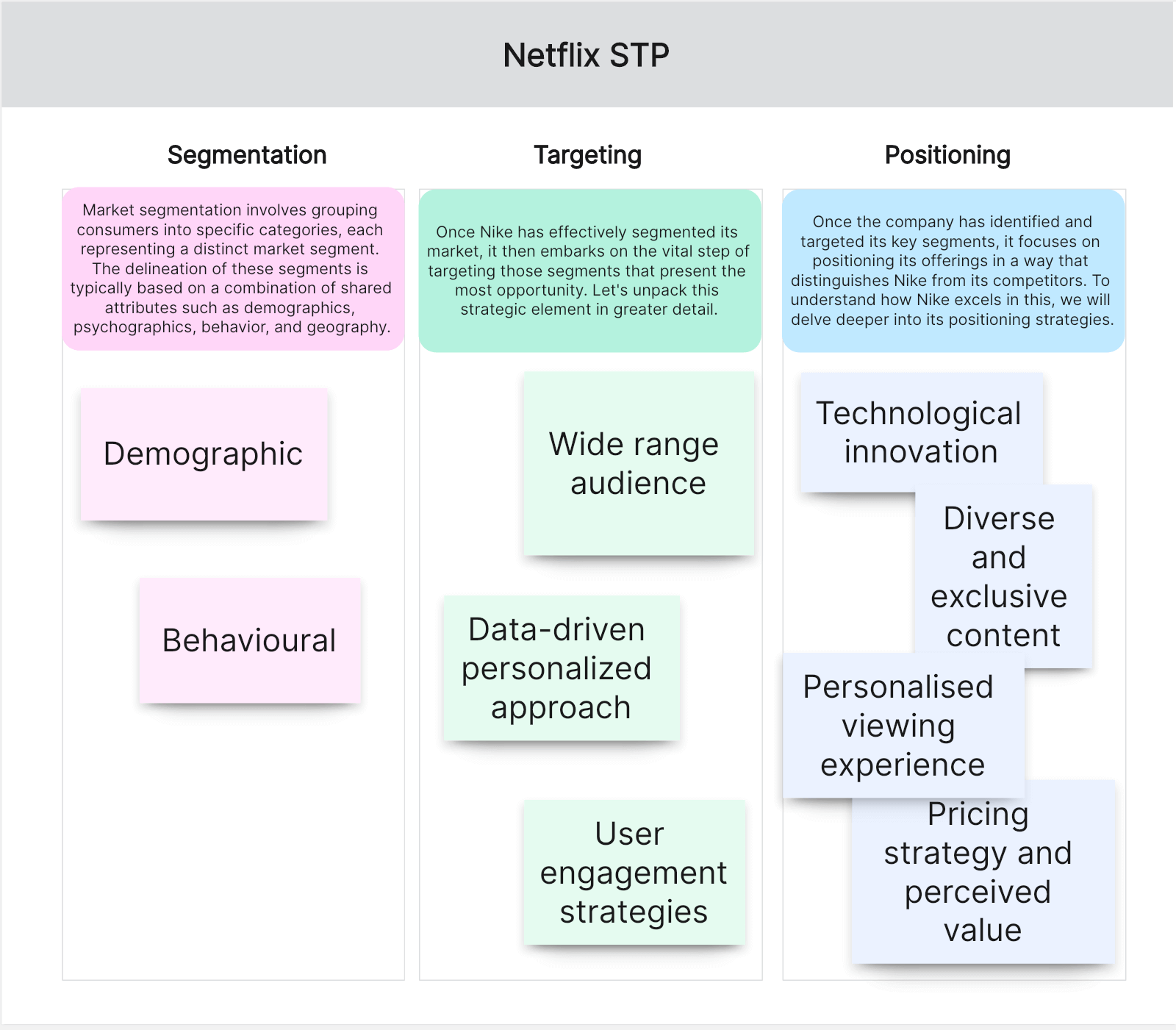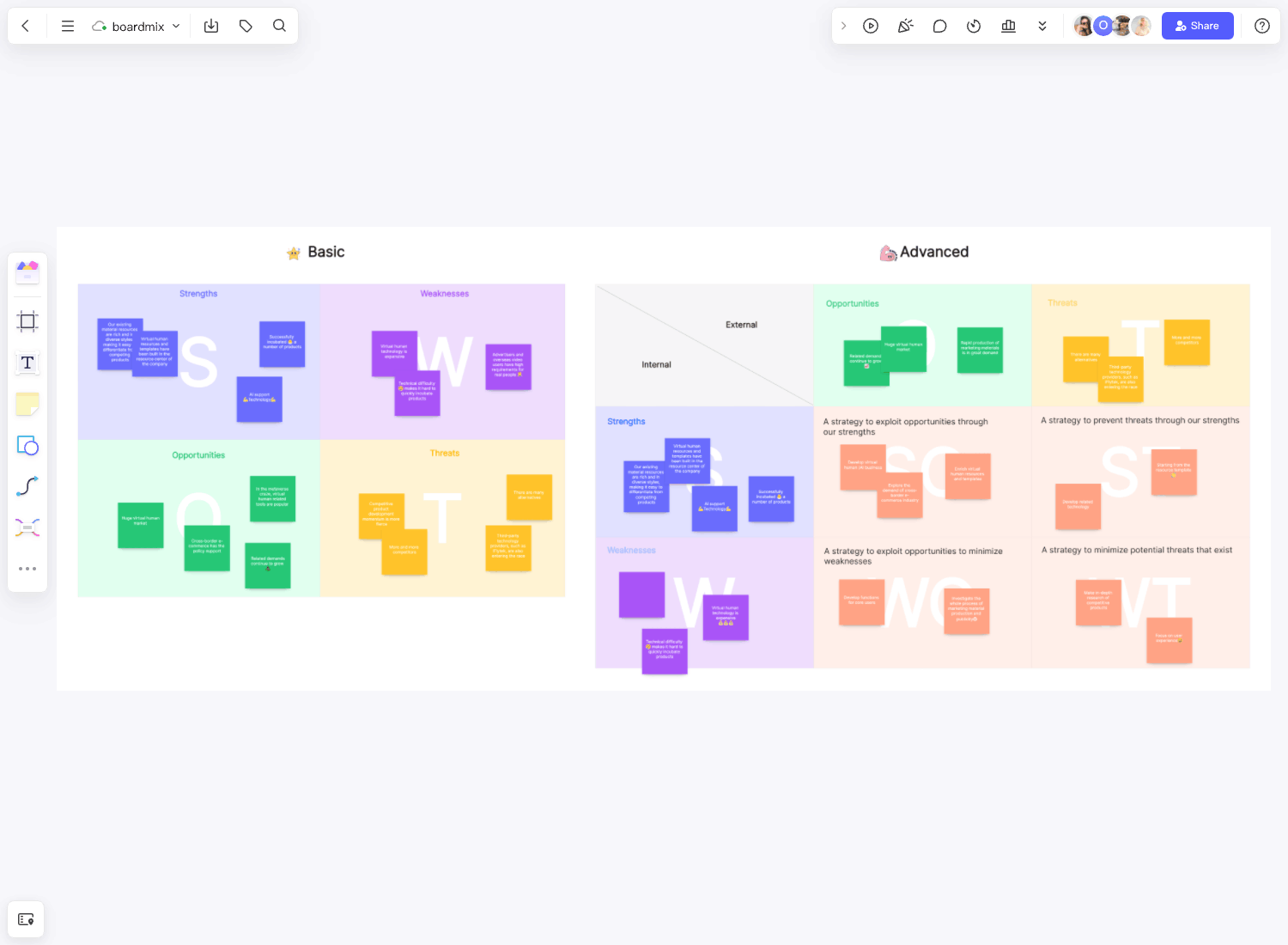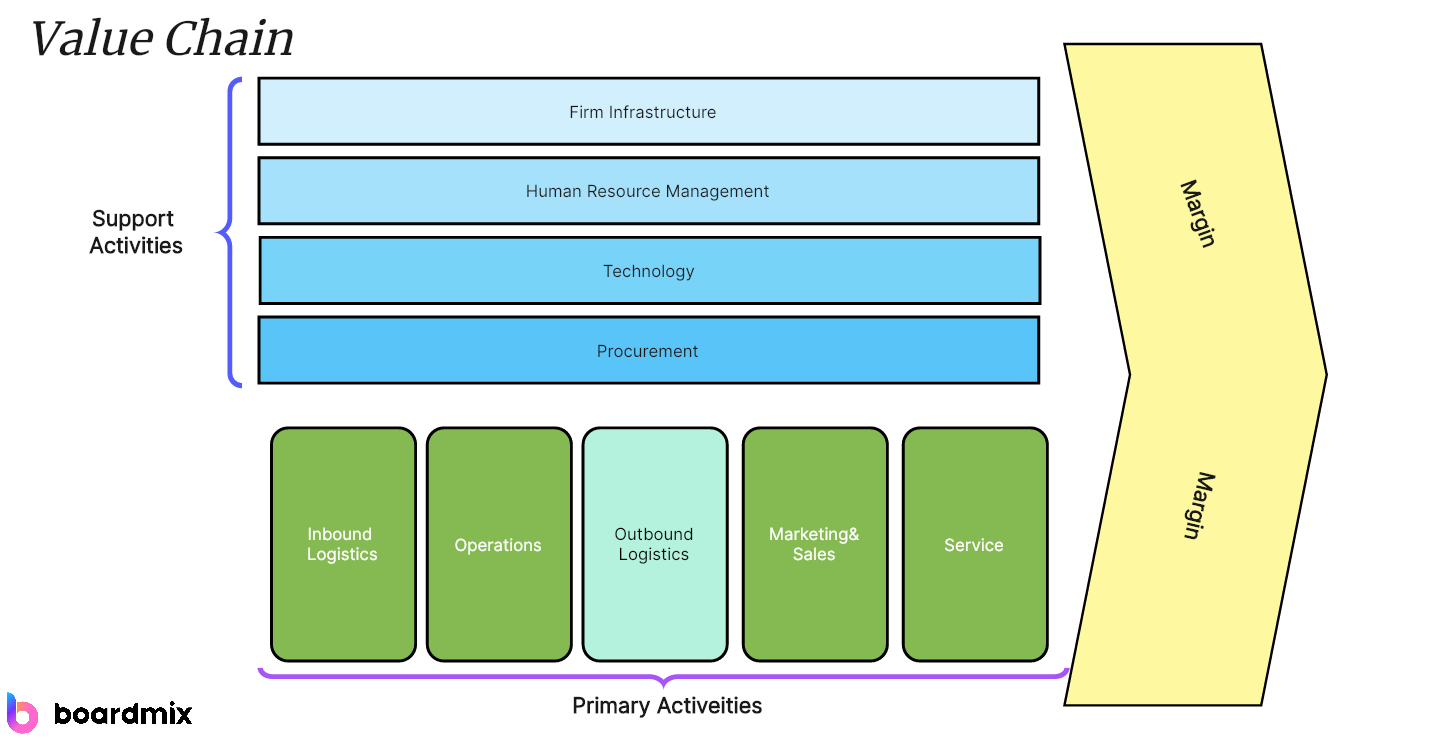In the high-octane world of streaming services, standing out amidst a sea of competitors requires more than just star-studded content and innovative technology. A fine-tuned marketing strategy is pivotal for a successful breakthrough. A befitting illustration of such marketing finesse is none other than Netflix, a global titan of the industry. Let's delve into Netflix's game-changing segmentation, targeting, and positioning strategy that has helped it sustain its cutting-edge relevance and appeal.
Mind Map of Netflix Segmentation, Targeting, and Positioning
Visualising marketing strategies can enhance comprehension significantly. A detailed mind map can aid in understanding how Netflix has intricately structured its segmentation, targeting, and positioning approach. It will illustrate how Netflix segregates its market segments, targets its potential consumers, and aligns its unique value proposition to gain an upper hand in this fiercely competitive industry.
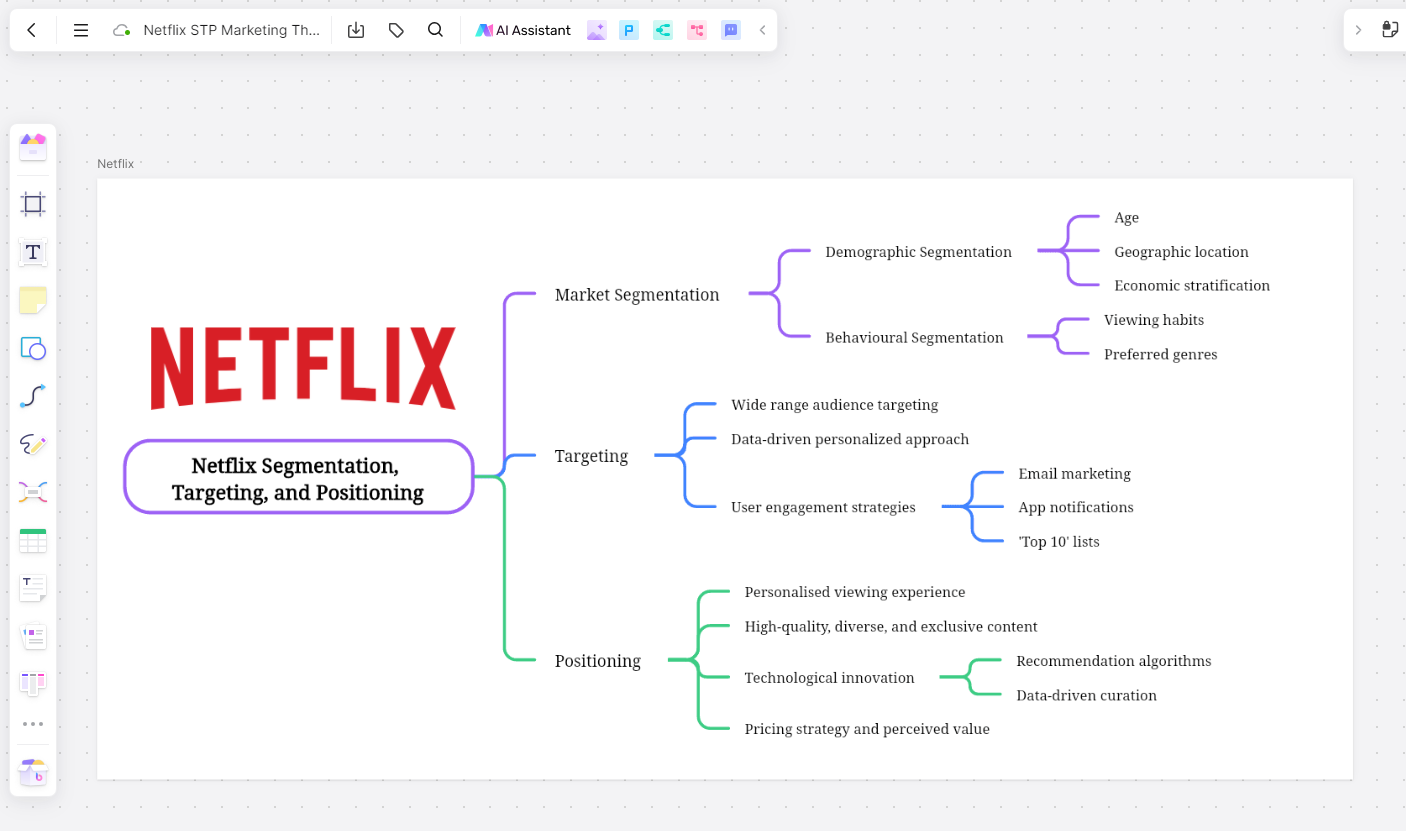
Market Segmentation of Netflix
A presice user persona and understanding the customer is the cornerstone of effective marketing analysis, and market segmentation is the tool to attain that. Market segmentation involves dividing a broad target market into subsets of consumers who have common needs and priorities. Netflix employs this approach brilliantly to provide tailored services to its massive user base.
The cornerstone of Netflix's market segmentation strategy revolves around demographic and behavioral dimensions. With its extensive content library, Netflix caters to a diverse age group ranging from teenagers savoring young-adult dramas to senior citizens enjoying classic movies. Unlike traditional broadcast networks limited by schedules and regional programming, Netflix breaks the demographic barrier, offering everyone, regardless of age or geographic location, a unique viewing experience.
From an age-based division, we delve into the geographic segmentation adopted by Netflix. It provides tailored content based on the geographical location of its viewers. This segmentation enables it to cater to the specific cultural and regional preferences of its audience, thereby creating a personalized experience for users across the globe.
Another aspect of demographic segmentation is economic stratification. Realizing that economic factors significantly influence subscription decisions, Netflix provides different subscription tiers. This strategy enables it to cater to different income groups, from budget-conscious students who might opt for the basic plan to high-income viewers who prefer premium offerings.
Moving from demographic to behavioural segmentation, Netflix’s strategy becomes even more customer-centric. It goes beyond basic personal data and dives deep into consumers' viewing habits and preferences. Leveraging data analytics, it analyses user behavior - how often users watch, their preferred genres, binge-watching patterns, etc. This data-driven approach allows Netflix to curate personalised content recommendations for its subscribers.
Targeting of Netflix
Having divided its market into various segments, Netflix's next marketing analysis comes into play: targeting. Targeting involves selecting one or more market segments and developing products and marketing mixes tailored to each. Netflix's unrivalled success lies in its capacity to implement this with precision and efficiency.
From teenagers engrossed in high-school dramas to adults relishing suspenseful thrillers, Netflix’s targeting strategy encompasses all. It carefully identifies the potential consumer groups from its segmented market and curates content that resonates with their specific preferences.
One crucial facet of Netflix's targeting is understanding the viewing behaviour of its audience. It captures and analyses data relating to the type of shows or movies frequently watched by viewers, the time they spend watching, and the frequency of their viewership. This granular understanding of its users' viewing habits equips Netflix with insights to personalise its offerings.
This personalised approach is visible in how Netflix manages its content library. Rather than presenting a homogenous list of titles to every user, it customises the viewing experience by suggesting shows and movies that align with individual preferences and past viewing habits. This refined targeting tactic makes every user's interaction with Netflix unique, increasing engagement and satisfaction rates.
Moreover, Netflix's targeted marketing extends beyond content recommendations. It includes email marketing and app notifications that alert users about new additions that fit their viewing history. Its algorithmically generated 'Top 10' lists also guide viewers towards popular content within their region, creating a communal viewing experience.
Positioning of Netflix
Positioning refers to the strategic endeavour that allows a company to stand distinct in the eyes of the customer. Netflix has effectively positioned itself not just as another video streaming platform, but as a premium provider of diverse and personalised content accessible anytime, anywhere.
To start with, Netflix has strategically branded itself to offer ‘your own personal Netflix’. By emphasising the personalised nature of its service, Netflix's positioning reinforces its commitment to offer an individualised viewing experience tailored to each viewer's preferences. It underscores how it enables subscribers to watch what they want, whenever they want, without the constraints of commercials or a broadcast schedule.
Netflix also positions itself as a curator of high-quality, diverse, and exclusive content. It doesn't just distribute content; it produces it. With an array of award-winning original series and movies in its arsenal, Netflix has defined itself as a producer of quality entertainment. This has significantly differentiated the brand in an otherwise crowded marketplace.
The positioning strategy is further strengthened by Netflix’s continuous investment in pioneering technology. Its recommendation algorithms and data-driven curation have become key selling points that enhance the user experience. These technical competencies have placed Netflix as a leader in technological innovation within the streaming industry.
Netflix's unique positioning is also apparent in its pricing strategy. Rather than competing on cost, it presents itself as a premium service offering value for money. While it provides different subscription tiers catering to various income groups, the emphasis remains on the quality of experience, content range, and convenience it offers.
Netflix Segmentation, Targeting, and Positioning Cheat Sheet
To summarise Netflix's intricate marketing approach in an easily digestible format, a comprehensive cheat sheet is instrumental. It presents the main tenets of Netflix’s marketing strategy – segmentation, targeting, and positioning – in a straightforward manner. This cheat sheet could serve as a quick reference guide for marketers seeking inspiration or individuals eager to understand this streaming giant's marketing prowess.
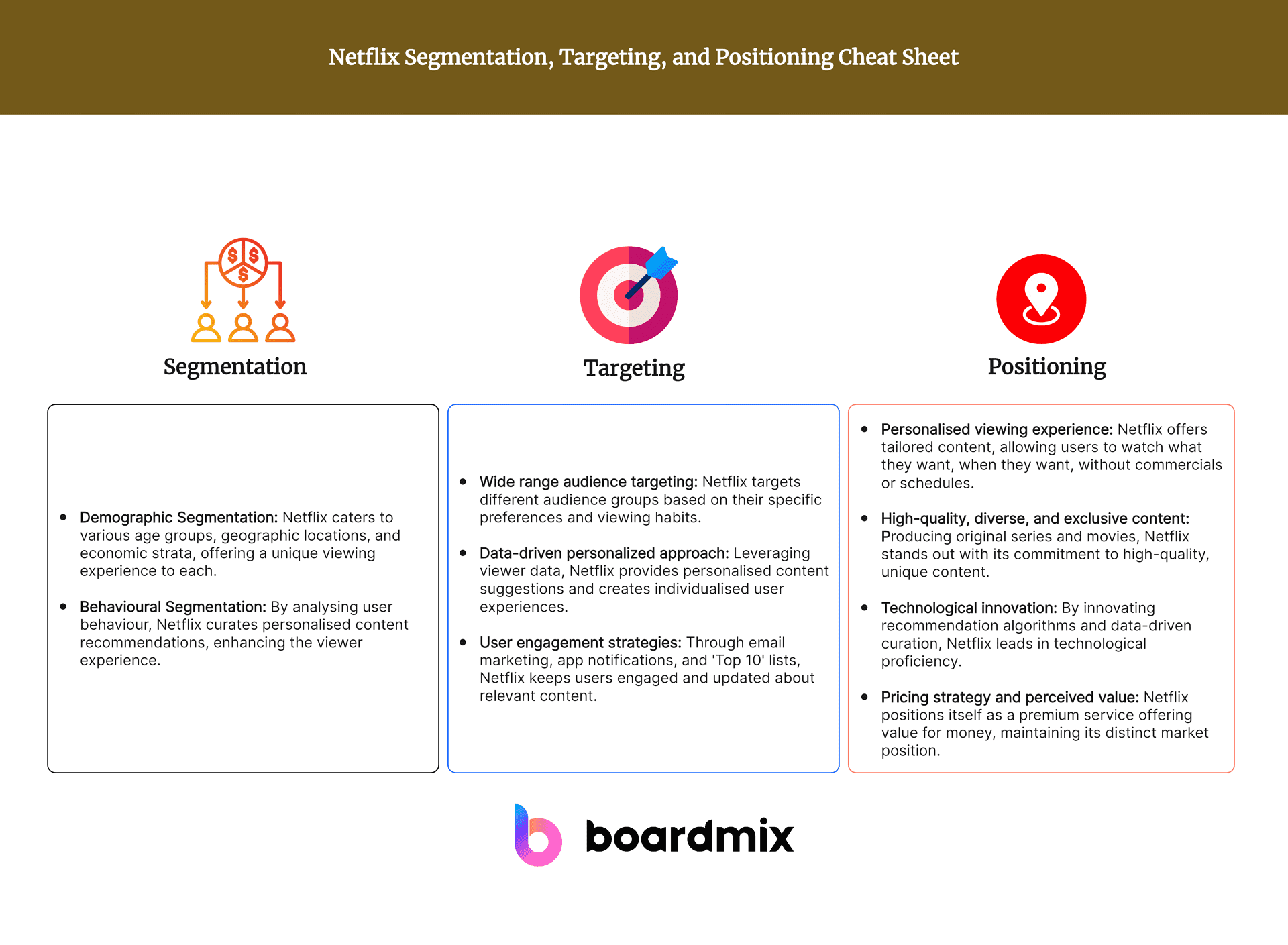
Key Takeaways: Making STP Strategy Analysis on Boardmix
Netflix’s triumphant story demonstrates the power of an intelligently crafted marketing strategy. Its segmented approach enables it to cater to a diverse subscriber base, while its personalised targeting maximises user engagement and retention. Its unique positioning, backed by a strong commitment to original content, strengthens its competitive advantage.
To replicate such success in your ventures, consider using our solution, Boardmix. With our pre-built Market Segmentation Template and STP Analysis Template, strategising marketing campaigns can be an efficient and enlightening process. Take a page out of Netflix's playbook and harness the power of intelligent marketing strategies to elevate your business.
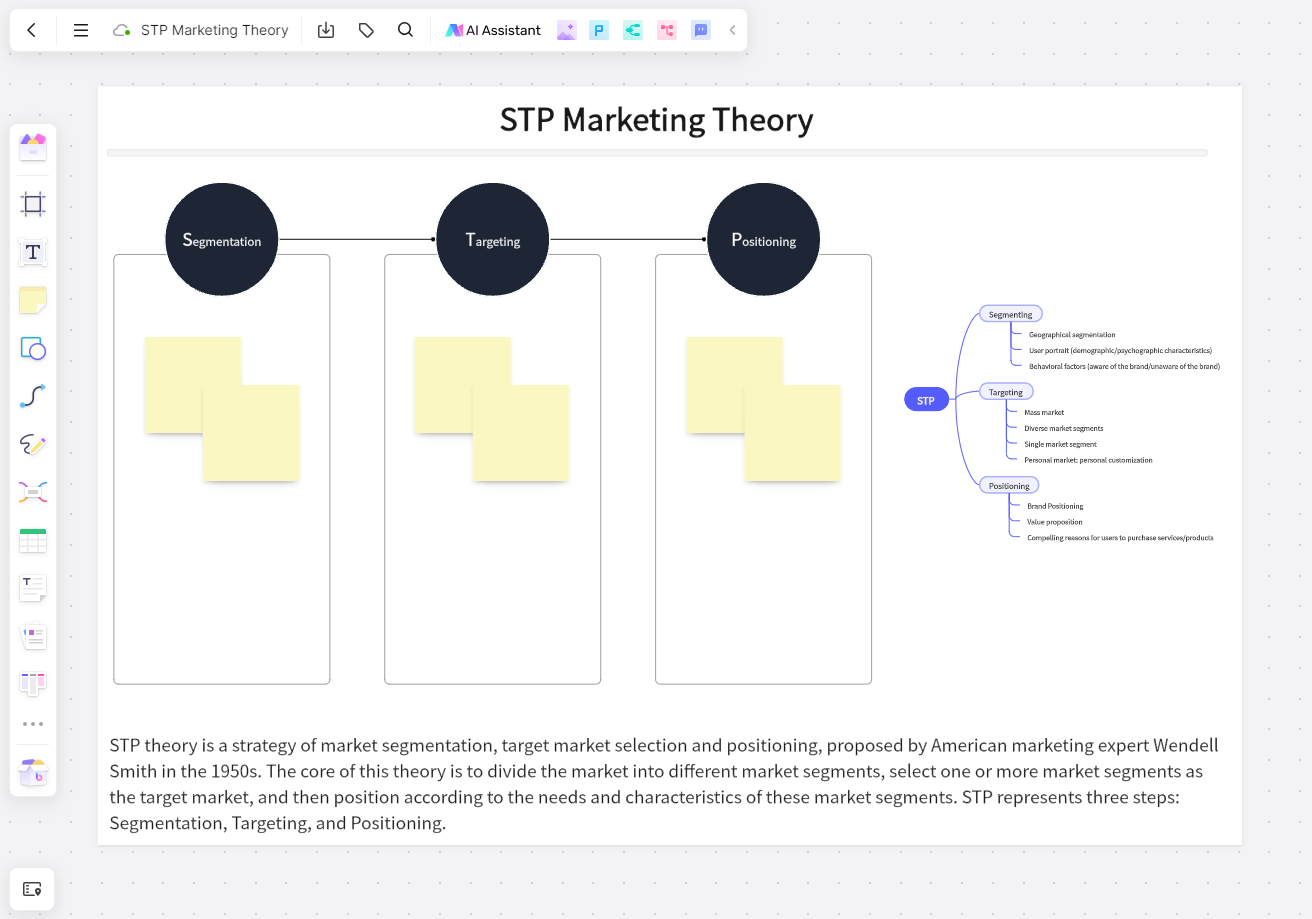
Understanding your brand's unique position in the market can give your business a competitive edge. Boardmix is an excellent tool for conducting a brand positioning analysis, providing various benefits.
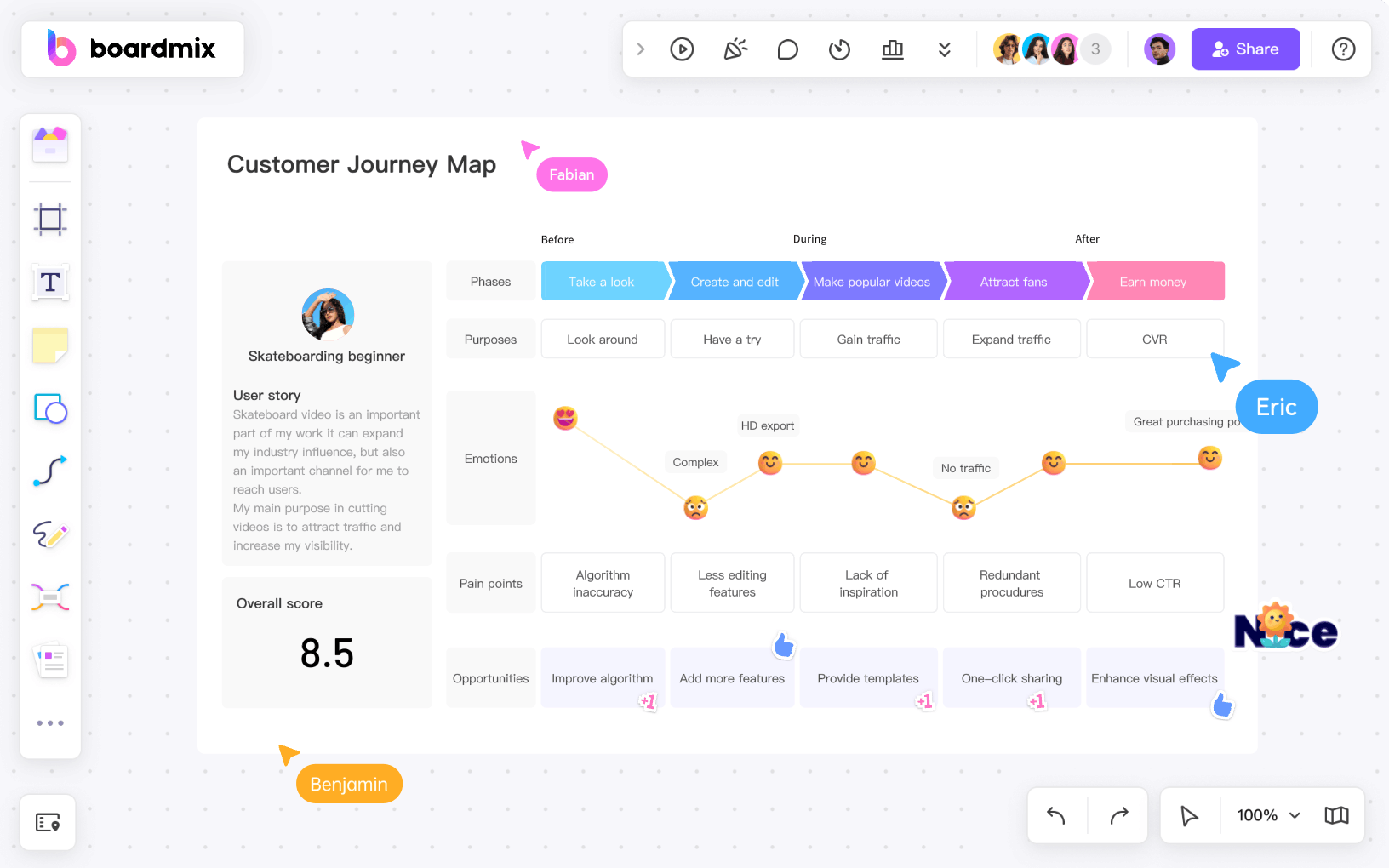
1. Structured Analysis
With Boardmix, you can use or create custom templates for your brand positioning analysis. These templates can guide you through the process, ensuring that all vital factors - such as Unique Selling Proposition (USP), target audience, brand values, brand personality, and key differentiators - are thoroughly addressed.
2. Collaboration
Brand positioning analysis often requires insights from various team members - from marketing to product development. Boardmix's collaboration features make it easy to involve your entire team in the process, facilitating an exchange of ideas and perspectives that can enrich your analysis.
3. Accessibility
With Boardmix, your brand positioning analysis is not just a static document. It's a dynamic resource that's accessible to your team members anytime, anywhere. This makes it easier to keep everyone aligned on your brand's positioning and strategic direction.
4. Iterative Refinement
The market is constantly evolving, and so should your brand positioning. Boardmix makes it easy to update your analysis as your brand grows and the market changes. You can easily add new insights, adjust your strategies, and keep your team informed about these changes.
5. Integrated Feedback
The platform allows stakeholders to provide their feedback directly on the analysis. This integrated feedback system streamlines communication and makes it easier to refine your brand positioning based on valuable input.
6. Historical Reference
Your previous brand positioning analyses on Boardmix can serve as valuable historical references. Comparing your current positioning with past strategies can offer insights into how your brand has evolved.
By facilitating collaboration, structuring analysis, and offering flexibility, Boardmix is a beneficial tool for any company looking to deepen its understanding of its brand positioning.











